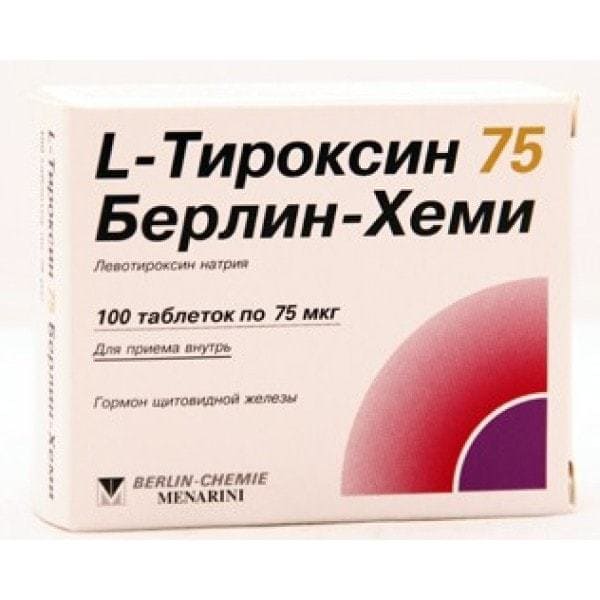You have no items in your shopping cart.

Sku:
Dosage form
Tablets from white to slightly beige, round, slightly biconvex, with valium for the division on one side and embossed with "75" on the other.
Composition
levothyroxine sodium 75 mcg
Excipients: calcium hydrogen phosphate dwuvodnyi, cellulose microcrystalline, carboximetilkrahmal sodium salt (type A), dextrin, glycerides of long chain partial
Pharmacological action
Synthetic preparation of thyroid hormone, levo isomer of thyroxine. After partial conversion to triiodothyronine (in the liver and kidneys), and to transition into the cells of the body, affects the growth and development of tissues, metabolism.
In small doses, has an anabolic effect on protein and fat metabolism. In moderate doses stimulates growth and development increases the demand of tissues in oxygen, stimulates the metabolism of proteins, fats and carbohydrates, increases the functional activity of the cardiovascular system and Central nervous system. In high doses inhibits the production TRH hypothalamus and TSH from the pituitary gland.
The therapeutic effect observed after 7-12 days, during that time are still valid after discontinuation of the drug. Clinical effect in hypothyroidism is manifested in 3-5 Diffuse goiter decreases or disappears within 3-6 months.
Pharmacokinetics
Suction
After ingestion of levothyroxine is absorbed almost exclusively from the upper small intestine. Absorbed up to 80% of the dose. Simultaneous eating reduces the absorption of levothyroxine. Cmax in serum is reached after about 5-6 hours after ingestion.
Distribution
Associated with whey proteins (thyroxine-binding globulin, thyroxine-binding prealbumin and albumin) are more than 99%. In various tissues montelaterone approximately 80% of levothyroxine with the formation of triiodothyronine (T3) and inactive products.
Metabolism
Thyroid hormones are metabolized primarily in the liver, kidney, brain and muscle. A small amount of drug undergoes deamination and decarboxylation, and conjugation with sulfuric and glukuronova acids (in the liver).
Excretion
Metabolites are excreted with urine and bile.
T1/2 is 6-7 days.
Pharmacokinetics in special clinical cases
For hyperthyroidism T1/2 shortened to 3-4 days, in hypothyroidism extended to 9-10 days.
Side effects
When using the drug for indications in recommended doses under medical supervision side effects are not observed.
In case of hypersensitivity to the drug may experience allergic reactions.
Special conditions
In hypothyroidism, due to lesions of the pituitary gland, it is necessary to find out whether there is a simultaneous adrenal insufficiency. In this case, substitution therapy with corticosteroids should be started before the treatment of hypothyroidism thyroid hormones to prevent the development of acute adrenal insufficiency.
Effects on ability to drive vehicles and management mechanisms
The drug has no effect on the ability to professional activities associated with driving vehicles and management mechanisms.
Testimony
— hypothyroidism;
— euthyroid goiter;
— as replacement therapy for prevention of relapse weeks after resection of the thyroid gland;
— thyroid cancer (after surgical treatment);
— diffuse toxic goiter: after achieving euthyroid state thyreostatics (monotherapy or combination);
as a diagnostic tool during the test thyroid suppression
Contraindications
— untreated thyrotoxicosis
— acute myocardial infarction, acute myocarditis;
— untreated insufficiency of adrenal function;
— increased individual sensitivity to product components.
With caution should designate product in coronary artery disease (atherosclerosis, angina pectoris, myocardial infarction in history), hypertension, arrhythmia, diabetes, severe long-existing hypothyroidism, the syndrome of malabsorption (may require dose adjustment).
Drug interactions
Levothyroxine increases the effects of indirect anticoagulants, which may require reduction of their dose.
The use of tricyclic antidepressants with levothyroxine may increase the action of antidepressants.
Thyroid hormones can increase the need for insulin and oral hypoglycemic drugs. More frequent monitoring of blood glucose is recommended during periods of starting treatment with levothyroxine, and when changing the dose of the drug.
Levothyroxine reduces the effect of cardiac glycosides. While the use of cholestyramine, colestipol and aluminium hydroxide reduces plasma concentration of levothyroxine due to the inhibition of its absorption in the intestine.
While the use of anabolic steroids, asparaginase, tamoxifen possible pharmacokinetic interaction at the level of protein binding.